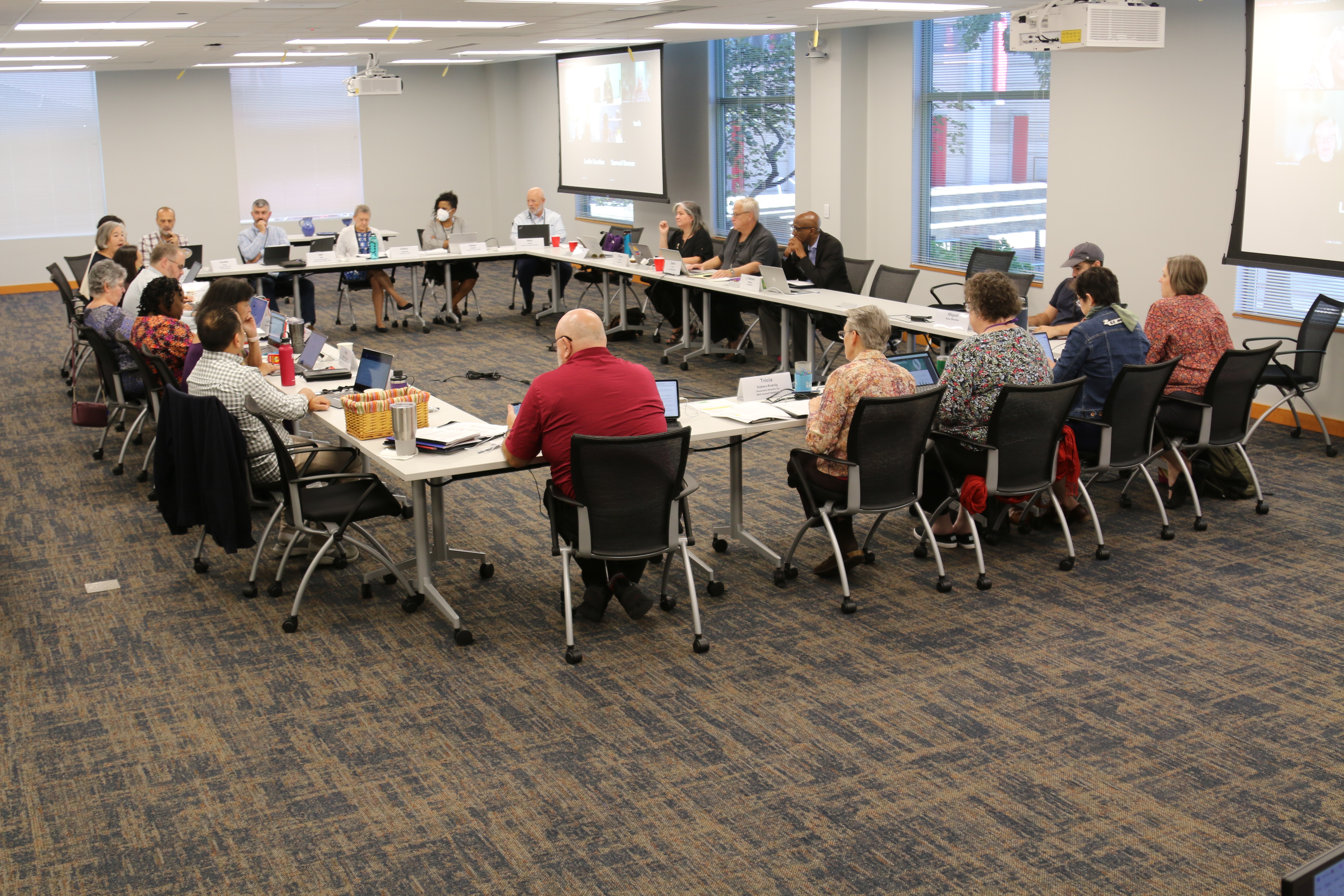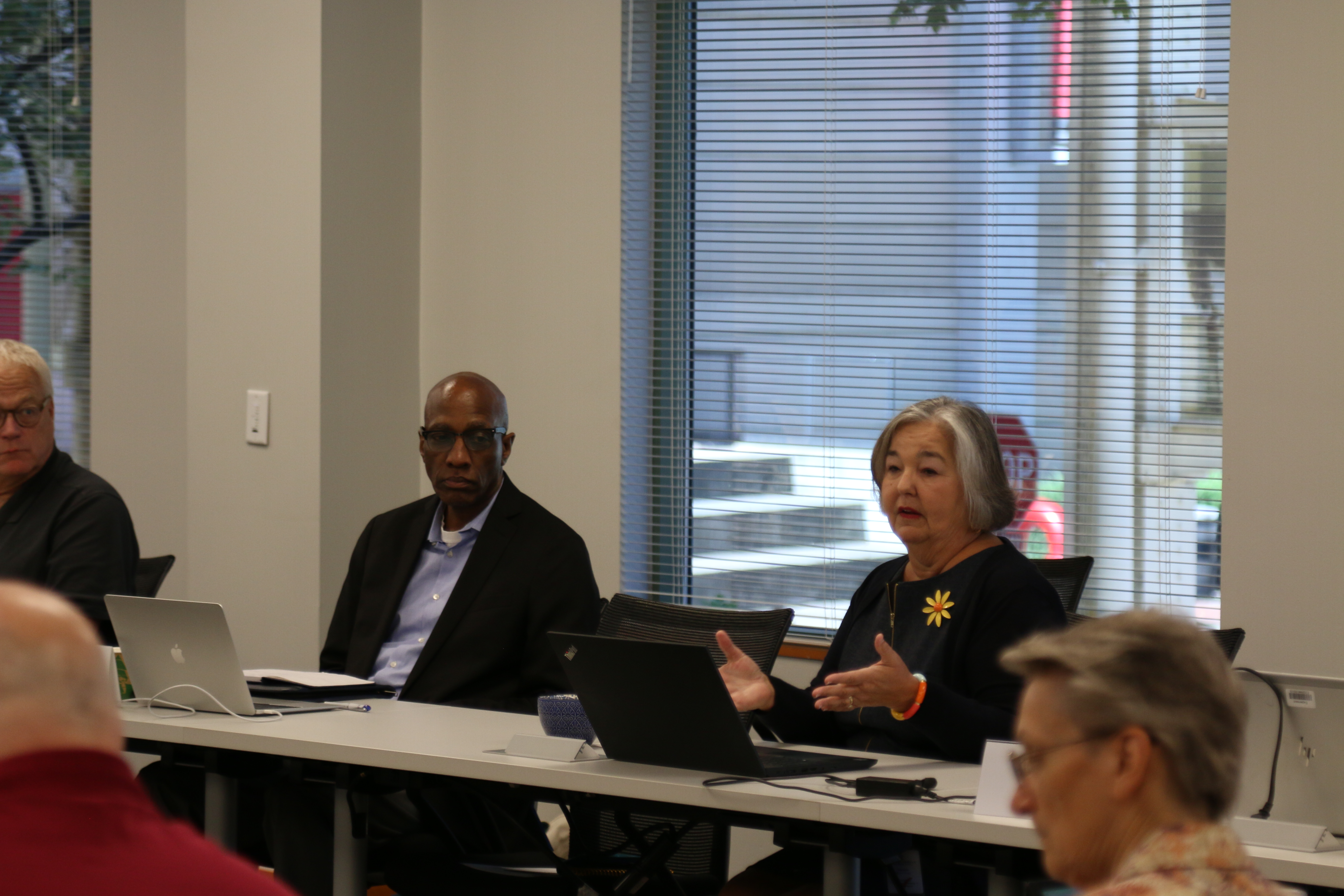
The Committee on the Office of the General Assembly has been holding its fall meeting in the new conference space at the Presbyterian Center in Louisville. Photo by Randy Hobson.
The Committee on the Office of the General Assembly opened its fall meeting this week at the Presbyterian Center in Louisville. This was the first meeting since the 225th General Assembly over the summer. While part of the time has been spent in orientation and updates, the committee also assessed the recently completed Assembly and began thinking about how to approach the 226th gathering in Salt Lake City in 2024.
Dr. Susan Barnett, director of the PC(USA)’s Research Services, presented results from its recent survey of commissioners and advisory delegates to the 225th General Assembly on their experiences with the church’s first hybrid Assembly.
- Preparation for GA: A majority of the commissioners and advisory delegates say they were satisfied with the preparation that went into this year’s Assembly.
- Technology support: Nearly 80% of the respondents were happy with the support they received as it relates to web applications and access to committee meetings and plenaries.
- Equity primes: More than 80% of respondents say their committee used equity primes during meetings to ensure all voices were heard on church business. More than half found the tools helpful or very helpful.
- Event participation: Worship was the most attended event by respondents, with 97% reporting to have participated. Juneteenth drew more than 55% participation, while the Hands and Feet event drew approximately 44%.
- BIPOC space participation: Nearly half of the qualifying respondents took part in the BIPOC (Black, Indigenous, People of Color) virtual and physical spaces made available at General Assembly, giving individuals an opportunity to connect and process their Assembly experiences.
- Satisfaction with the 225th General Assembly: Approximately 83% of commissioners and advisory delegates report being satisfied or very satisfied with the Assembly and most agree or strongly agree that the work of the Assembly was accomplished.
Barnett said 405 commissioners and advisory delegates responded to the survey.

Dr. Susan Barnett, director of the PC(USA)’s Research Services, presents survey results from the 225th General Assembly to COGA on Thursday. Photo by Randy Hobson.
“Across the board, folks very satisfied by the language services offered at GA. Those who speak English were very pleased by the committee sessions that were offered in another language, some adding that we should have been doing this before,” she said. “This is important to what the PC(USA) is and is becoming. At least 60% said it gave them an opportunity to appreciate what it’s like for those whose language is not English. They found it challenging but want to do it again and are very proud it happened.”
Barnett added that most respondents were pleased with the use of equity primes and believe the church needs to continue their use and extend it across the denomination for other meetings.
“There were those that felt it was a huge time commitment. We need to lift up that 10% who participated in the Assembly were working individuals who did so at a loss of income,” she said. “There are those outside the church environment who took their vacation time to participate, and some didn’t have time to take a few days off before going back to work or took a sacrifice of income.”
The average responders were either Teaching or Ruling Elders, white, female and 58 years old.
“There are 2,500 comments that we are still working to analyze. Some respondents wrote a phrase, others wrote a lot more and hit multiple topics and we’re still breaking those out,” said Barnett. “When given the opportunity to express their views, that’s where the jewels are. There are little things that pop up.”
The General Assembly voted to make the 226th Assembly a hybrid gathering as well, with a few changes. Committees will be meeting virtually, while plenaries will be held in person in Salt Lake City. COGA has begun looking at how to structure the online committee gatherings. During a staff presentation on Thursday, two proposed options were presented. One option had all committees meeting concurrently online for three days, then traveling to Salt Lake City for plenaries. The second option would have groups of committees meeting online for two days over two weekends, shortening the entire commitment to the Assembly.
Much of the discussion surrounded how to best meet the needs of commissioners and advisory delegates while taking into consideration time commitments for the Assembly. The 225th hybrid gathering lasted three weeks. Both COGA and OGA staff agree that needs to change for the 226th.
“I’m a ruling elder and work for a mid council. If I’m someone working 40, 60, 80 hours Monday through Friday, then going into online committee, that’s a lot. I’ve advocated for years over the way our Assembly enables those who work exclusively at church to be there, but it costs those of us in secular jobs a lot just to be there,” said Ruling Elder Miguel Rosa Morales. “We had 15% participation by Young Adult Advisory Delegates this summer because it was three weeks long. That’s not feasible for someone in college. Summer jobs are ways that can help them financially through the year. We cannot sacrifice the YAADs.”
There was lengthy discussion around tweaking the options to meet time needs, including a consideration to move the election of a moderator/co-moderators until after the committee meetings at the start of plenary sessions.
“What would be helpful for us is to have a sense of priorities you have on how those online committees work. Fewer meetings over more days or shorter days and longer meetings,” said Trigger Duffert. “Having your input on what you’d prefer will help us format something to give you.”
Conversation will continue during COGA’s monthly online meeting on Oct. 20.
COGA also welcomed new members to the committee:
- Teaching Elder Joseph (Joe) Chu
Paramus, New Jersey
- Teaching Elder Chenyangu (Cheni) Khonje
Bloomfield, New Jersey
- Ruling Elder Miguel Rosa Morales
Trujillo Alto, Puerto Rico
- Ruling Elder Ximena Leroux (Corresponding Member)
Presbyterian Mission Agency Board
Atlanta
